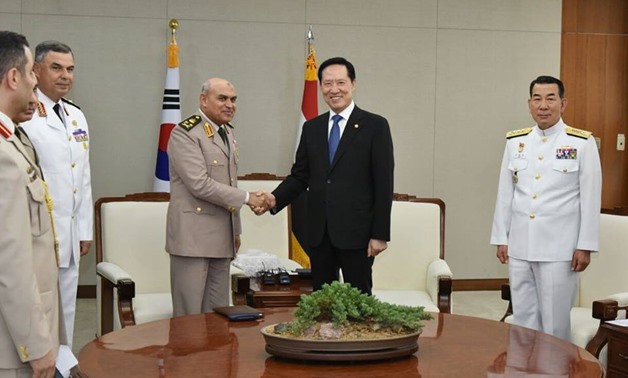
Egyptian defense minister Sedqi Sobhi and his South Korean counterpart Song Young-moo in Seou
CAIRO – 11 September 2017: Egypt's Minister of Defense General Sedky Sobhy joined on Monday meetings with a number of top South Korean officials and high-ranking army members during his visit to the capital Seoul, the spokesperson of the Egyptian military forces stated on Monday on his Facebook page.
Sobhy is heading a high-level Egyptian military delegation on an official visit upon an invitation from his South Korean counterpart Song Young-moo aiming to discuss military and security cooperation between the two countries, the statement added.
 Egyptian defense minister Sedqi Sobhi and his South Korean counterpart Song Young-moo in Seoul
Egyptian defense minister Sedqi Sobhi and his South Korean counterpart Song Young-moo in Seoul
The Egyptian delegation was welcomed officially in the Defense Ministry in Seoul, the national anthems were played and then the two ministers discussed military and security cooperation between the two sides. They exchanged their visions concerning the changes occurring on the regional and international levels.
Sobhy also met with Korean Minister of Foreign Affairs Kang Kyung-wha and the head of the Defense Acquisition Program Administration (DAPA). They discussed topics that have common interest for the two countries, including the international war on terrorism and the latest developments in the Middle East region.
 Egyptian defense minister Sedqi Sobhi and his South Korean counterpart Song Young-moo in Seoul
Egyptian defense minister Sedqi Sobhi and his South Korean counterpart Song Young-moo in Seoul
The defense minister arrived in Seoul over the weekend for a five-day visit as a follow-up to the memorandum of understanding on defense cooperation between South Korea and Egypt, which was signed in March, South Korean news agency YONHAP reported.
In March 2016, Egypt's President Abdel Fatah al-Sisi visited South Korea and met with then-president Park Geun-hye, where they signed nine memorandums of understanding in the fields of industry, education, transportation and justice, Ahram online reported.
Following Sisi’s visit, South Korea vowed to provide Egypt with a financial package worth $3 billion for export credits and to develop infrastructure in the transport, energy and water resources sectors.


Comments
Leave a Comment